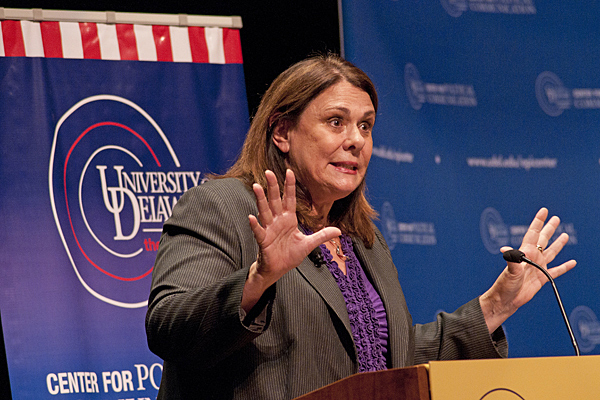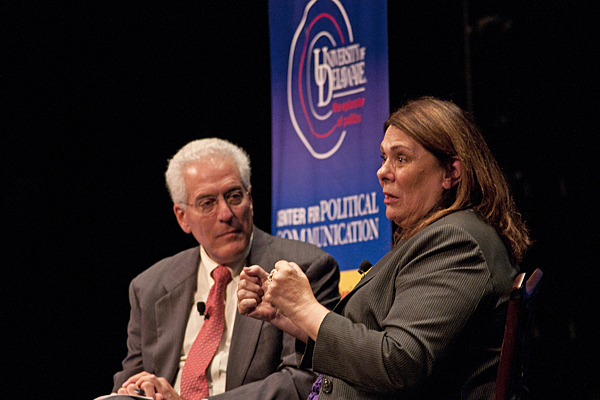Political rage
In National Agenda talk, CNN’s Crowley offers bad news and good

2:11 p.m., Sept. 15, 2011–Politics in the United States might well be at “defcon level” in terms of rage, gridlock, misunderstanding, disinformation and preening, CNN political reporter Candy Crowley told a large National Agenda speaker series audience Wednesday evening, Sept. 14, in the University of Delaware’s Mitchell Hall. But, she added, there is hope.
“In terms of pure vitriol, this is the worst I’ve seen,” Crowley said, from angry citizens at rallies and town hall meetings to the heated rhetoric of elected officials on Capitol Hill. “I am stunned, sometimes, at the rage.”
While the U.S. has seen gridlock as a result of fundamental differences between Democrats and Republicans before, Crowley said the current situation is of special concern because “the stakes are enormous.”
“Gridlock hurts more when the American people are hurt,” she said.
Crowley cited three key problems fueling gridlock — lack of understanding, a never-ending news cycle and the Internet gone wild.
“What we have in Washington is a failure to understand,” Crowley said, noting that no one understands where the person on the other side is coming from, “nor do they seem to want to.”
Crowley said that while it might be good politics not to understand, it makes for bad governance. “If you don’t understand where someone is coming from, you can’t find a place to meet.”
Concerning the 24/7 news cycle, Crowley said that among politicians “lots of power is derived from being on television.” In essence, she said, the “first guy who gets to the camera wins” and lawmakers today are putting out statements even before something has happened.
“Every day is a violation of your mother’s rule to think before you speak,” she said, adding that if there is no thought process, people are just blurting out words.
Crowley said she believes the Internet has coarsened the language of the discourse, and has allowed for the anonymous propagation of disinformation. “There are no filters, no regulations. You don’t know where to get the truth,” she said, adding that “honest dialogue becomes the victim in all this.”
Crowley suggested Internet site ratings along the lines of hotel ratings — five stars for dependable websites, one star for those not so dependable.
An added factor, Crowley said, were the last two elections. The 2006 election saw a Democratic victory that swept a number of centrist Republicans out of office in northeastern states, and the 2010 election saw a Republican victory that swept a number of “blue dog” Democrats out of office in Southern states. “The people who are most likely to compromise are gone,” she said, and the “results are pretty serious.”
But there is good news, Crowley said, a statement that drew a response from the audience given the abundance of bad news.
“The parts are better than the whole,” she said of the individuals in the U.S. Senate and House of Representatives. “By and large, the people who come to Washington want to help,” and, “If the parts are better than the whole, we can overcome this.”
She said she believes members of Congress got an earful when they went back to their districts during the August break.
“I think there is hope,” she said. “If not, there is an election.”
National Agenda series

The 2011 National Agenda speaker series, sponsored by the Center for Political Communication, is titled “Girding for Battle: Political Movers and Shakers at the University of Delaware.”
National Agenda lectures are held at 7:30 p.m. every other Wednesday, having begun Sept. 14 and continuing through Nov. 16. Lectures are held in Mitchell Hall and moderated by Ralph Begleiter, director of the Center for Political Communication.
The next lecture will be held Wednesday, Sept. 28, and will feature national political strategists Chris Lehane and Steve Schmidt. The series will continue: Oct. 5, with Pamela Constable of the Washington Post; Oct. 19, with political ad campaigners Joe Slade White and Valerie Biden Owens; Nov. 2, with political watchdog Melanie Sloan; and Nov. 16, with New Jersey Gov. Chris Christie.
Article by Neil Thomas
Photos by Duane Perry
